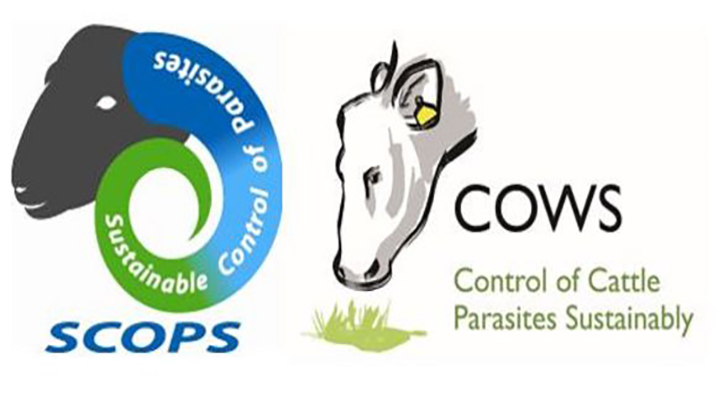Members of the groups Sustainable Control of Parasites in Sheep (SCOPS) and Control of Worms Sustainably (COWS), welcome the recognition by the British Veterinary Association (BVA) of the need for a cohesive strategy to tackle future parasiticide resistance, with the publication of their new policy on responsible use of parasiticides in grazing animals.
However, the call to tackle resistance is not new and was the very reason SCOPS and COWS were created, 21 and 15 years ago respectively. These cross industry groups, made up of farmers, SQPs, vets and academics, have provided the latest thinking in sustainable parasite control and best practice for more than two decades.
“Prescribing anthelmintic products is far from simple,” says independent sheep consultant and founder of SCOPS, Lesley Stubbings.
“Progress towards more responsible and sustainable use encompasses several factors requiring the involvement of many people, including farmers, manufacturers, prescribers/retailers, the regulator, vets and scientists.
“In all our guidance over the years, SCOPS has produced consistent, evidence-based and scientifically proven support. This has been taken up by many farmers, seen in the move away from blanket administration and recognising the benefits of testing before treating.”
COWS secretary Sara Gregson adds. “The COWS technical guide, which is on the website, is at the core of what we do. It provides the latest research findings and advice on how to tackle roundworms, lungworms, liver fluke and ectoparasites in cattle, in the most responsible yet effective manner to ensure high animal health and welfare, whilst protecting the environment.
“A SCOPS/COWS environmental sub-group also meets twice a year to find ways of integrating environmental concerns into existing COWS and SCOPS principles.”
SCOPS and COWS are both affiliated members of the Responsible Use of Medicines in Agriculture (RUMA) Alliance. RUMA Agriculture’s secretary general Chris Lloyd, supports the breadth and expertise provided by SCOPS and COWS on anthelmintic use.
He said: “Whenever RUMA Agriculture is asked questions about worms and worming we advise enquirers to visit the SCOPS and COWS websites, because these are the go-to places for the latest independent information and best practice guidelines. We signpost from a dedicated antiparasiticides area on our website, which we have had for many years, as we too recognise the importance of tackling future parasiticide resistance.
“The SCOPS and COWS information also forms a major part of the SQP syllabus and examination and is built into specific modules on parasite management CPD training.
“We would welcome the BVA directing their members to SCOPS and COWS for anthelmintic advice and CPD training, to ensure consistent guidance is being given on-farm. The mantra has been to treat only when necessary and with the right product in the right way, as this will help slow the development of resistance to the active ingredients, whilst also reducing the potential threats to wildlife and the environment.”
However, the call to tackle resistance is not new and was the very reason SCOPS and COWS were created, 21 and 15 years ago respectively. These cross industry groups, made up of farmers, SQPs, vets and academics, have provided the latest thinking in sustainable parasite control and best practice for more than two decades.
“Prescribing anthelmintic products is far from simple,” says independent sheep consultant and founder of SCOPS, Lesley Stubbings.
“Progress towards more responsible and sustainable use encompasses several factors requiring the involvement of many people, including farmers, manufacturers, prescribers/retailers, the regulator, vets and scientists.
“In all our guidance over the years, SCOPS has produced consistent, evidence-based and scientifically proven support. This has been taken up by many farmers, seen in the move away from blanket administration and recognising the benefits of testing before treating.”
COWS secretary Sara Gregson adds. “The COWS technical guide, which is on the website, is at the core of what we do. It provides the latest research findings and advice on how to tackle roundworms, lungworms, liver fluke and ectoparasites in cattle, in the most responsible yet effective manner to ensure high animal health and welfare, whilst protecting the environment.
“A SCOPS/COWS environmental sub-group also meets twice a year to find ways of integrating environmental concerns into existing COWS and SCOPS principles.”
SCOPS and COWS are both affiliated members of the Responsible Use of Medicines in Agriculture (RUMA) Alliance. RUMA Agriculture’s secretary general Chris Lloyd, supports the breadth and expertise provided by SCOPS and COWS on anthelmintic use.
He said: “Whenever RUMA Agriculture is asked questions about worms and worming we advise enquirers to visit the SCOPS and COWS websites, because these are the go-to places for the latest independent information and best practice guidelines. We signpost from a dedicated antiparasiticides area on our website, which we have had for many years, as we too recognise the importance of tackling future parasiticide resistance.
“The SCOPS and COWS information also forms a major part of the SQP syllabus and examination and is built into specific modules on parasite management CPD training.
“We would welcome the BVA directing their members to SCOPS and COWS for anthelmintic advice and CPD training, to ensure consistent guidance is being given on-farm. The mantra has been to treat only when necessary and with the right product in the right way, as this will help slow the development of resistance to the active ingredients, whilst also reducing the potential threats to wildlife and the environment.”


